Dear friends, guess what! Today’s article will cover one special freshwater fish – puffer fish, which may be a challenge to keep in your aquarium. Yeah, we will talk about freshwater puffer fish from their types, diet, care guide, and something like that.
Content Table
Freshwater Puffer Fish
Freshwater puffer fish may be difficult to breed. And one interesting thing here. Faced with stress and shocks, puffer fish would inflate themselves with water or air. However, a pufferfish may be poisonous. Seeing that, puffer fish may contain lethal toxins, like tetrodotoxin and saxitoxin. Such toxins are damaging and even fatal for both other fish and humans.
Usually, there are surprisingly diverse freshwater puffer fish. For example:
| Congo puffer | Red-eye puffer |
| Dwarf puffer | Golden puffer |
| Imitator puffer | Mbu puffer |
| Fahaka puffer | South American puffer |
| Target puffer | Ocellated puffer |
Next, we will list some freshwater puffer fish mentioned above.
Congo puffer
Congo puffers, also named potato puffers, are native to Africa. They are not active and fancy staying at the bottom of fish tanks and hiding in the substrate, especially when waiting for hunting. Accordingly, you should create a level of sand as the substrate. Additionally, seeing that Congo puffers are sensitive to nitrates, keeping great water quality is essential. Hence, it is vital to hold them in a 40-gallon fish tank at least and create a great filtration system.
| Family | Tetraodontidae | 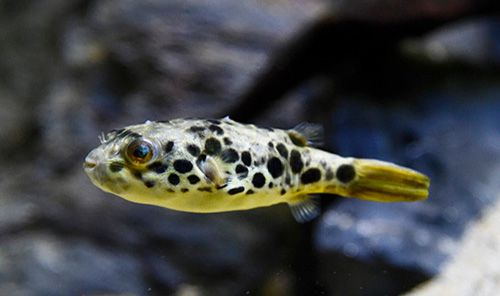 |
|
| Water temperature | 75-82℉ | Diet | piscivore |
| pH level | 6.5-7.5 | Lifespan | 10–15 years |
| Size | 5–6 inches | Minimum tank size | 40 gallons |
Red-eye puffer
Red-eye puffers feature eyes in red. The puffers are aggressive. Thus, it is better not to keep them with other puffers in a fish tank. Furthermore, a large tank size and a great water filtration system are needed. Because red eye puffers would produce much waste. Also, you can add some aquatic plants, such as the Amazon sword.
| Family | Tetraodontidae | 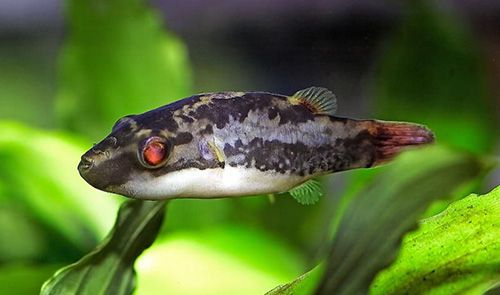 |
|
| Water temperature | 76-78℉ | Diet | Carnivore |
| pH level | 6.0-7.0 | Lifespan | 4–5 years |
| Size | 2–3 inches | Minimum tank size | 10-20 gallon |
Dwarf puffer
Dwarf puffers are in small sizes and are also famous as Pygmy puffers and Pea puffers. They are easy to keep. Featuring a small size and light green body with black spots, the dwarf puffers have become popular among aquarists. Besides, dwarf puffers are active, aggressive, and sensitive. Consequently, it is recommended to keep them alone in a fish tank with great water quality and stable water parameters.
| Family | Tetraodontidae | 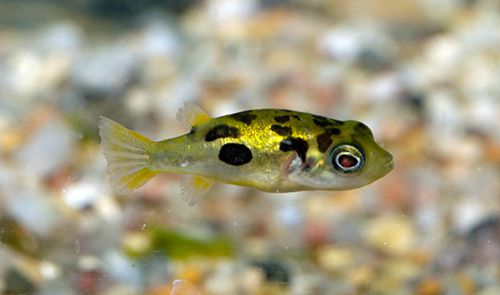 |
|
| Water temperature | 74-82℉ | Diet | Carnivore |
| pH level | 7.0-7.6 | Lifespan | 3–4 years |
| Size | less than 1.5 inches | Minimum tank size | 10 gallons |
Are Dwarf Puffer Fish Easy to Keep
Are puffer fish hard to keep? Not absolutely, it varies from different fish types. Generally, dwarf puffer fish are easy to maintain. For how to care for freshwater puffer fish, you should make sure of a comfortable living environment, a proper diet, suitable tank mates, and something like that.
In general, a large fish tank is better. It can reduce the risk of water parameter fluctuation and provide sufficient space for fish to swim and explore. Likewise, puffer fish are sensitive to water conditions. Accordingly, you can add an aquarium filter to keep clean water. Also, an aquarium heater would be helpful to maintain a stable water temperature.
Usually, the water temperature in freshwater puffer fish aquariums should be kept between 74℉ and 78℉. Besides that, puffer fish need hiding places. Hence, you can decorate the fish tank with some aquarium decorations, like caves, rocks, hollow tree trunks, and plants.
In addition to the living environment, puffer fish compatibility should be considered. Some freshwater puffer fish would nip other fish’s fins, while some are aggressive. Take dwarf puffer fish as an example, they are small but aggressive. However, though it is better to keep them alone, you can hold them with fast-moving fish, such as danios. On the other side, some must be kept single in a tank, such as Mbu puffer fish, Mekong puffer fish, and Nile puffer fish. In a word, you should be cautious when introducing tank mates to puffer fish aquariums.
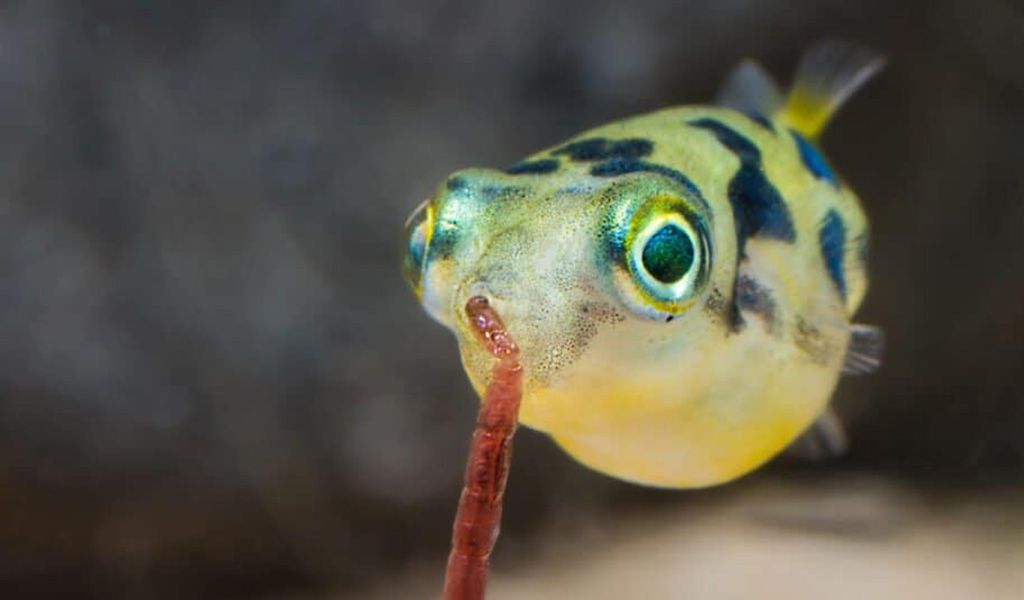
What Do Puffer Fish Eat?
What do puffer fish eat? It depends on the fish types. Some are piscivores, like Congo puffer. And some are carnivores, for instance, the Red-eye puffer. At the same time, there are omnivores, golden puffers for example. Nonetheless, no matter what you feed, you should ensure a proper and balanced diet. In addition to meat, you can provide some vegetables from time to time.
For instance, once or twice each week. Aside from that, puffer fish’ teeth would not stop growing. It means that their teeth will keep growing as they get older. As a result, you should give them food with a rigid substrate, which could limit the teeth’ growth. Snails, crustaceans, or shellfish are great alternatives. Nevertheless, if the teeth are too long, you can clip them.
Next, we will share some available food for different types of puffer fish.
| Pufferfish types | Available food |
| Piscivorous | Small fish, earthworms, snails, cockroaches, frozen food |
| Carnivorous | Worms, bloodworms, mosquito larvae, snails, live shrimps, small feeder fish, frozen food |
| Omnivorous | Worms, algae, crabs, live food, frozen food, flakes, pellets |
Sum Up
After reading, have you learned more about freshwater puffer fish? Exactly, if you are a beginner for puffer fish, a small one is a better choice, like Dwarf puffers. It would make your first puffer fish trip more enjoyable. Moreover, the small size makes the dwarf puffers perfect for small aquariums. That is all for today. Finally, thank you for your reading.
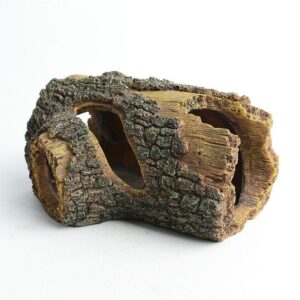
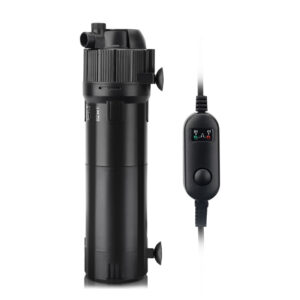
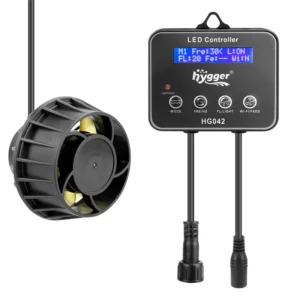
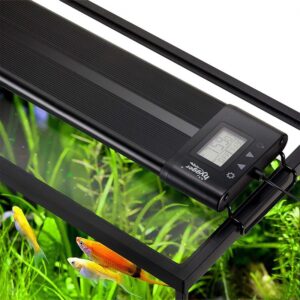
Leave a comment